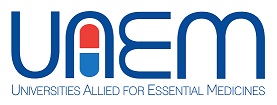Top Qs
Timeline
Chat
Perspective
Universities Allied for Essential Medicines
From Wikipedia, the free encyclopedia
Remove ads
Universities Allied for Essential Medicines (UAEM) is a student-led organization working to improve access to and affordability of medicines around the world, and to increase research and development of drugs for neglected tropical diseases.
This article has multiple issues. Please help improve it or discuss these issues on the talk page. (Learn how and when to remove these messages)
|
Supported by a board of directors and guided by an advisory board that includes Partners in Health co-founder Paul Farmer and Nobel Laureate Sir John Sulston, UAEM has mobilized hundreds of students on more than 100 campuses in more than 20 countries.[1] These student advocates have convinced universities worldwide to adopt equitable global access licensing policies for licensing their medical research, in order to make life-saving health innovations affordable and accessible in low and middle income countries.
Remove ads
Publications
UAEM has published two student-led research projects. The "University Report Card", which ranks universities on their contributions to global health, received coverage in The New York Times.[2] Reports were released for universities in Canada, the United Kingdom, and the United States.[3]
"Re:Route" maps of biomedical research and development (R&D) alternatives.[4]
Campaigns
The organization has worked globally on a campaign aimed at encouraging the World Health Organization to discuss an R&D agreement. In 2019, it began a two-year campaign targeting agencies providing public funding for biomedical research around the world under the name "Take Back Our Medicines" (TBOM).[5]
In March 2020, UAEM launched the "Free the Vaccine for COVID-19" campaign in conjunction with the Center for Artistic Activism, with the primary goal to ensure that publicly-funded COVID-19 tests, treatments and vaccines would be sustainably priced, available to all and free at the point of delivery. [6][7]
Remove ads
Chapters
The basic units of the organizations are called chapters. A chapter is a self-organised group of students, primarily based at an academic institution often with faculty support. Chapters range in size, from more intimate groups of 2 or 3, to larger gatherings of around 30 or more students.[8] UAEM chapters are present in the US, United Kingdom, Canada, Australia, Iran, India, Brazil, Sudan, Austria, Switzerland, Germany, Denmark and The Netherlands.
See also
References
External links
Wikiwand - on
Seamless Wikipedia browsing. On steroids.
Remove ads

